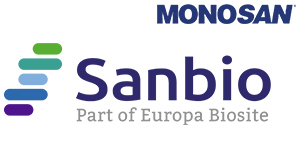Mouse anti-MYOD1, clone 5.8A (Monoclonal)
Mouse anti-MYOD1, clone 5.8A (Monoclonal)
Artikelnummer
SANMON10218
Verpackungseinheit
1 ml
Hersteller
Sanbio / Monosan
Verfügbarkeit:
wird geladen...
Preis wird geladen...
Clone Number: 5.8A
Immunogen: Recombinant mouse MyoD1 protein
Concentration: n/a
Format: Concentrate
Storage buffer: Bioreactor Concentrate with 0.05% Azide
Additional info: Recognizes a phosphor-protein of 45kDa, identified as MyoD1. The epitope of this MAb maps between amino acid 180-189 in the C-terminal of mouse MyoD1 protein. It does not cross react with Myogenin, Myf5, or Myf6. Antibody to MyoD1 labels the nuclei of myoblasts in developing muscle tissues. MyoD1 is not detected in normal adult tissue but is highly expressed in the tumor cell nuclei of rhabdomyosarcomas. Occasionally nuclear expression of MyoD1 is seen in ectomesenchymoma and a subset of Wilm’s tumors. Weak cytoplasmic staining is observed in several non-muscle tissues, including glandular epithelium and in rhabdomyosarcomas, neuroblastomas, Ewing’s sarcomas and alveolar soft part sarcomas. Pre-treatment: Heat induced epitope retrieval in 10 mM citrate buffer, pH6.0, or in 50 mM Tris buffer pH9.5, for 20 minutes is required for IHC staining on formalin-fixed, paraffin embedded tissue sections. Note: Dilution of the antibody in 10% normal goat serum followed by a goat anti-mouse secondary antibody-based detection is recommended. Control tissue Rhabdomyosarcoma. Staining Nuclear (only nuclear staining should be considered as evidence of skeletal muscle differentiation).
References: Thulasi R et. al. Cell Growth and Differentiation, 1996, 7(4):531-41./Wesche WA et. al. American Journal of Surgical Pathology, 1995, 19(3):261-9./Parham DM et. al. Acta Neuropathologica, 1994, 87:605-11.
Immunogen: Recombinant mouse MyoD1 protein
Concentration: n/a
Format: Concentrate
Storage buffer: Bioreactor Concentrate with 0.05% Azide
Additional info: Recognizes a phosphor-protein of 45kDa, identified as MyoD1. The epitope of this MAb maps between amino acid 180-189 in the C-terminal of mouse MyoD1 protein. It does not cross react with Myogenin, Myf5, or Myf6. Antibody to MyoD1 labels the nuclei of myoblasts in developing muscle tissues. MyoD1 is not detected in normal adult tissue but is highly expressed in the tumor cell nuclei of rhabdomyosarcomas. Occasionally nuclear expression of MyoD1 is seen in ectomesenchymoma and a subset of Wilm’s tumors. Weak cytoplasmic staining is observed in several non-muscle tissues, including glandular epithelium and in rhabdomyosarcomas, neuroblastomas, Ewing’s sarcomas and alveolar soft part sarcomas. Pre-treatment: Heat induced epitope retrieval in 10 mM citrate buffer, pH6.0, or in 50 mM Tris buffer pH9.5, for 20 minutes is required for IHC staining on formalin-fixed, paraffin embedded tissue sections. Note: Dilution of the antibody in 10% normal goat serum followed by a goat anti-mouse secondary antibody-based detection is recommended. Control tissue Rhabdomyosarcoma. Staining Nuclear (only nuclear staining should be considered as evidence of skeletal muscle differentiation).
References: Thulasi R et. al. Cell Growth and Differentiation, 1996, 7(4):531-41./Wesche WA et. al. American Journal of Surgical Pathology, 1995, 19(3):261-9./Parham DM et. al. Acta Neuropathologica, 1994, 87:605-11.
| Artikelnummer | SANMON10218 |
|---|---|
| Hersteller | Sanbio / Monosan |
| Hersteller Artikelnummer | MON10218 |
| Verpackungseinheit | 1 ml |
| Mengeneinheit | STK |
| Reaktivität | Human, Mouse (Murine), Rat (Rattus), Chicken |
| Klonalität | Monoclonal |
| Methode | Immunohistochemistry (paraffin) |
| Isotyp | IgG1 kappa |
| Wirt | Mouse |
| Konjugat | Unconjugated |
| Produktinformation (PDF) | Download |
| MSDS (PDF) |
|

 English
English







